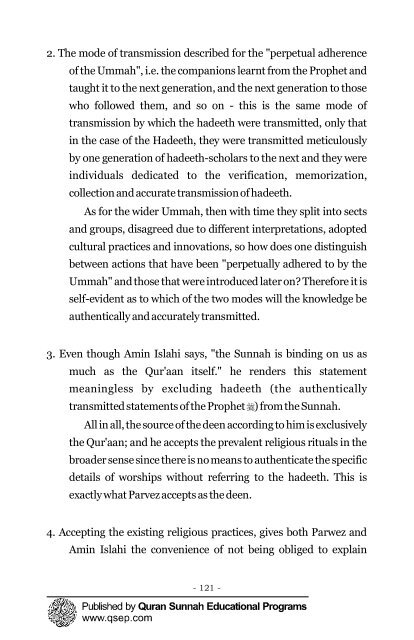Modernists And Hadith Rejecters by Sajid A. Kayum
Many more Islamic media to read, listen, print and download at ww.IslamicGlobe.com and at www.QuranReciter.org
Many more Islamic media to read, listen, print and download at
ww.IslamicGlobe.com and at www.QuranReciter.org
Create successful ePaper yourself
Turn your PDF publications into a flip-book with our unique Google optimized e-Paper software.
2. The mode of transmission described for the "perpetual adherence<br />
of the Ummah", i.e. the companions learnt from the Prophet and<br />
taught it to the next generation, and the next generation to those<br />
who followed them, and so on - this is the same mode of<br />
transmission <strong>by</strong> which the hadeeth were transmitted, only that<br />
in the case of the Hadeeth, they were transmitted meticulously<br />
<strong>by</strong> one generation of hadeeth-scholars to the next and they were<br />
individuals dedicated to the verification, memorization,<br />
collection and accurate transmission of hadeeth.<br />
As for the wider Ummah, then with time they split into sects<br />
and groups, disagreed due to different interpretations, adopted<br />
cultural practices and innovations, so how does one distinguish<br />
between actions that have been "perpetually adhered to <strong>by</strong> the<br />
Ummah" and those that were introduced later on? Therefore it is<br />
self-evident as to which of the two modes will the knowledge be<br />
authentically and accurately transmitted.<br />
3. Even though Amin Islahi says, "the Sunnah is binding on us as<br />
much as the Qur'aan itself." he renders this statement<br />
meaningless <strong>by</strong> excluding hadeeth (the authentically<br />
transmitted statements of the Prophet r) from the Sunnah.<br />
All in all, the source of the deen according to him is exclusively<br />
the Qur'aan; and he accepts the prevalent religious rituals in the<br />
broader sense since there is no means to authenticate the specific<br />
details of worships without referring to the hadeeth. This is<br />
exactly what Parvez accepts as the deen.<br />
4. Accepting the existing religious practices, gives both Parwez and<br />
Amin Islahi the convenience of not being obliged to explain<br />
- 121 -














